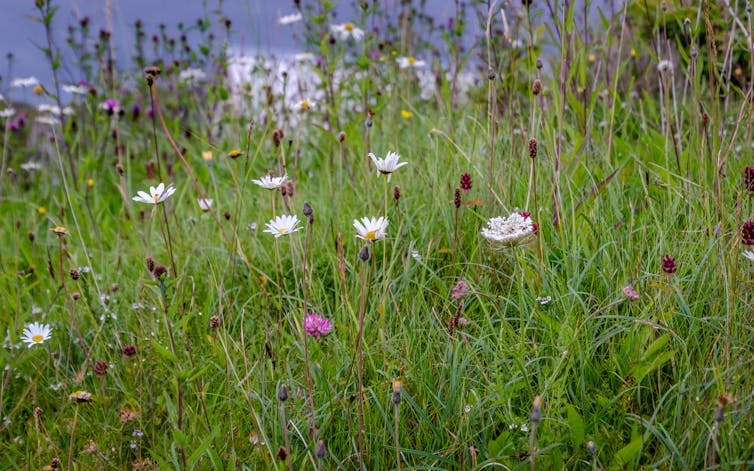
The UK government is making serious investments in new infrastructure as part of its post-pandemic recovery strategy, with £27 billion committed to road expansion, and a target of building an additional 300,000 homes per year. But it also has ambitious targets to halt and reverse wildlife declines by the end of the decade.
Addressing potential trade-offs between these objectives, the 2021 Environment Act made it mandatory (after a two-year transition) for most new developments in England to achieve a “biodiversity net gain” – a measure to ensure nature is left better off overall than before the project began. The government is now consulting on how to implement the legislation – but as it stands, we worry that the policy contains loopholes and will be nearly impossible to enforce.
The principle behind biodiversity net gain is simple, and has the potential to be a significant improvement on the current planning system. To get planning permission, proposed new developments will need to assess the biodiversity value of the site before construction, using a metric that accounts for the size, conservation value and condition of different habitats at the site. Developers also have to demonstrate that their actions will lead to overall biodiversity value rising by at least 10% after the project is completed.

As an example, if a housing development were to be built on a field, a developer could generate biodiversity gains by improving all the patches of habitat that remain within the project footprint, like grassland verges between the buildings or along pathways or roads. If these gains were not enough to achieve a 10% increase overall, they might buy “biodiversity offsets” from other landholders elsewhere to make up the difference. These are conceptually similar to carbon offsets, though with their own unique complications.
The idea of infrastructure and housing improvements that also lead to gains for nature is alluring. However, experience with similar policies (both overseas and in the UK) that allow developers to damage nature and then compensate for that damage – either on-site or elsewhere via offsets – have shown that, when it comes to realising real-world benefits for nature, the devil is in the detail.
Serious issues
We are part of a group of researchers who specialise in understanding what makes these policies succeed or fail, and we have uncovered a series of serious issues that risk undermining the government’s proposal. We have written an open letter to the relevant ministers highlighting these issues, and suggested concrete proposals for how they can be addressed. While the government is consulting on the regulations is the time to address these structural flaws.
The biggest problem that we found is the policy’s proposed monitoring and enforcement mechanisms. We are tracking the outcomes of biodiversity net gain in councils which have adopted the policy early, and have found that the vast majority of the benefits promised by developers are within the development sites themselves, predominantly through enhancing areas of grassland throughout the site or in recreational greenspaces.
It will be left to the existing planning enforcement system, overseen by local authorities, to ensure these “on-site” habitats actually deliver for nature. There are many risks: promised enhancements may not actually be implemented in the first place, they may not deliver the promised biodiversity gains, or biodiversity-improvement areas could be put to other uses further down the line.

Our worry is that local authorities do not have the resources and capacity to ensure these biodiversity gains are actually realised and sustained. Indeed, the government currently advises local authorities against taking planning enforcement action unless a violation is considered a “serious harm to a local public amenity”. It is extremely unlikely that the failure to deliver a habitat that was promised in a planning application several years ago will meet this threshold. As a result, as things stand, most of the promised biodiversity benefits risk being unenforceable.
Incentivised to overpromise
The current consultation also indicates that the government is considering allowing developments that promise to deliver a “surplus” of biodiversity (that is, more than 10% increase) to sell on their surplus to other developers, as long as they can demarcate the area used to deliver these surplus benefits. This risks creating a system where developers are incentivised to overpromise their biodiversity gains, in the knowledge that they will not be held accountable if those promises don’t materialise.
We risk creating a trade in “shadow” biodiversity gains that exist on paper but don’t improve nature in reality. These problems could be addressed if planning authorities had the resources to actually monitor and enforce the promises made by developers. However, a recent BBC investigation found that only 20% have any in-house ecological expertise that would enable them to do this.
Biodiversity net gain could be a world-leading policy for navigating complex trade-offs between infrastructure and nature. But the issues our team has identified risk turning a well-intentioned policy into a harmful one. There is an urgent need to fix these gaps and ensure local authorities can enforce the rules. Otherwise the policy will end up being “net gain” in name, but not in nature.

Don’t have time to read about climate change as much as you’d like?
Get a weekly roundup in your inbox instead. Every Wednesday, The Conversation’s environment editor writes Imagine, a short email that goes a little deeper into just one climate issue. Join the 10,000+ readers who’ve subscribed so far.
Sophus zu Ermgassen receives funding from NERC Joseph William Bull receives research funding from the UK Darwin Initiative, European Commission, and NERC. He is a Director of Wild Business Ltd.
E.J. Milner-Gulland is part of the Treasury Green Book working group on biodiversity. She also chairs the Darwin Expert Committee for Defra and is a trustee of WWF-UK. She is currently funded by UKRI to research BNG-related issues.
Joseph William Bull receives research funding from the UK Darwin Initiative, European Commission, and NERC. He is a Director of Wild Business Ltd.
This article was originally published on The Conversation. Read the original article.







